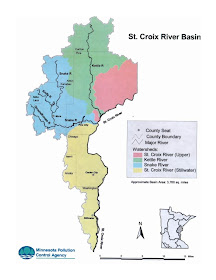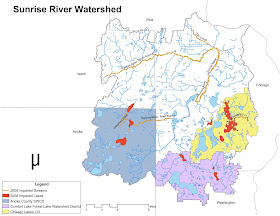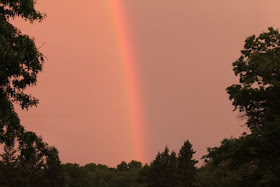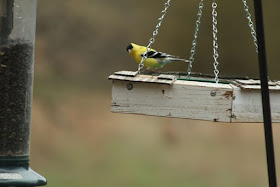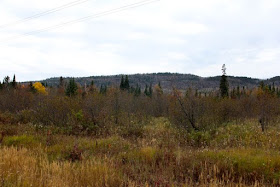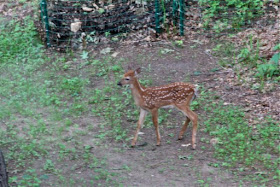Today we received a notice from our township supervisor alerting us to a proposal to expand the current Chisago Lakes Improvement (taxing) District [LID] to align with a new and improved watershed boundary. If the expansion is approved, properties newly added to the district will probably see an increase in taxes. Today's posting isn't about a tax increase however. That may or may not be the issue. I don't understand why the County Commissioners and the LID board can't provide a detailed set of maps that clearly delineates which properties are in and out of the current and proposed district and why. Here's some background:
- The Chisago Lakes Lake Improvement District and the Chisago County Commissioners are proposing to adjust the boundary of the LID.
- From the maps they provided as links, I can't tell whether or not my property (which is located along the western boundary of the watershed) is in the "official 2009 Chisago Lakes Chain of Lakes Watershed developed by the Minnesota Department of Natural Resources" or just across the line in the Carlos Avery Unit.
- The area I'm particularly interested in lies between County Roads 19 and 80 on this map. The text and the legend don't make it clear how DNR delineated the western watershed boundary and what the dashed and red lines in the area of interest are supposed to show.
The Sunrise River watershed isn't identified on this map
Further troubling my impression of a lack of rigorous accountability and focus on mission are these statements on the LID's web site:
"The Chisago Lakes Lake Improvement District partners with other organizations such as Chisago Soil & Water Conservation District, local communities, lake associations, state and federal agencies.... The following fact sheets highlight 2014 Chisago Lakes Lake Improvement District activities that benefit lakeshore, non-lakeshore, city, and rural residents.
- 295th Street Neighborhood Retrofit – Lindstrom
- Aquatic Invasive Species Treatment
- Chisago County Children’s Water Festival
- Chisago County Water Quality and Aquatic Invasive Species Monitoring
- Chisago Lakes Watershed Best Management Practices Implementation
- Carp Management
- Ditch and Weir Maintenance
- Fish Kill Disposal
- Furgala/Labernik Rain Garden – Center City
- Groundwater Observation Wells
- Hook, Line and Sinker Recycling Program and Summary
- Lake Avenue Dead End Street Project – Chisago City
- Lake Level Monitoring Program
- Lake Level Graphs
- Summary for Chisago Lakes Chain of Lakes Watershed lake level monitoring activities
- Lake Water Quality Monitoring
- Loren’s Park – Center City
- Minimal Impact Design Standards
- North Center North Lindstrom Channel
- Pleasant Hill Park – Lindstrom
- Public Outreach and Awareness
- Pumphouse Park/Elm Street Project – Lindstrom
- Rural Subwatershed Assessment
- Septic System Compliance
- Slow No-Wake Ordinance
- South Center Lake Boat Launch – Lindstrom
- Surfland Neighborhood Rain Gardens – Chisago City
- Swamp Lake Outlet Easements
- Urban and Shoreline Best Management Practices
- Water Trail System
- Watercraft Inspection Program
- Watercraft Inspection Report"
The yellow area is the Chisago Lakes District
Perhaps I wouldn't be as disturbed as I am if I hadn't recently been reading the Watershed Restoration and Protection Strategy Report for the Sunrise River Watershed, prepared by the Minnesota Pollution Control Agency. The Chisago Lakes watershed is part of the Sunrise River watershed, which is part of the Lower St. Croix River Watershed that is part of the Mississippi River Watershed. The WRAPS report notes
"Many key partners have been brought together to make this WRAPS Report a useable document that will ultimately help us to meet the goals of the Sunrise River Watershed and the Direct Drainage to the St. Croix River. These groups include: Anoka CD, Chisago SWCD, Isanti SWCD, Washington CD, Chisago County, MN DNR (Fisheries and Eco/Waters), MPCA, City of North Branch, City of Stacy, City of Wyoming, City of Shafer, City of Taylors Falls, USDA NRCS, Sunrise River Water Management Organization, Comfort Lake-Forest Lake Watershed District, Chisago Lakes Lake Improvement District, Linwood Lake Association, and Friends of the Sunrise River. These groups have collaborated with the Chisago SWCD to provide comments and additions specific to their subwatersheds. This collaboration will prove to be pivotal in applying for funding in the future to complete projects in each constituent’s jurisdiction."
Here's my basic complaint: Nowhere can I find a clearly laid out matrix of which agency or agency is responsible for which issue in which jurisdiction. Nowhere can I find a coordinated work program and budget that aligns resources with priorities. I'm not suggesting that all these folks aren't doing good and necessary work. I am stating unequivocally that we, the taxpayers and resource users, don't know. We'll report back here from time to time as we, hopefully, make some progress on this.
Issa’s Cricket
On a branch
floating downriver
a cricket, singing.
Issa (Japan, 1763-1827)
[translated by Jane Hirshfield]
********************************************
Thanks for visiting. Come again when you can.
Please be kind to each other while you can.
Tuesday, June 30, 2015
Water management is all wet. Who's in charge?
Monday, June 29, 2015
Should Minnesota sue SCOTUS?
Today the Supreme Court of the United States seems to have concluded that consideration of industrial costs is more important than public health. They remanded the United States Environmental Protection Agency's mercury regulations back to the Agency "to reconsider costs to power plants before deciding whether the regulations are 'appropriate and necessary.' Presuming it considers these costs and decides that the regulations remain necessary, the EPA may again impose the new emissions standards."
Minnesota's Impaired Waters
One factor I haven't seen mentioned is that, in Minnesota, the state depends on federal actions to address mercury pollution and related fish consumption advisories. "There is a strong connection between the Minnesota Department of Health Fish Consumption Advisory (FCA) and MPCA’s impairment determination....Atmospheric deposition of mercury is uniform across the state and supplies more than 99.5% of the mercury getting into fish." "Currently, 998 impaired waters are covered by the TMDL (671 lakes and 327 river reaches) and 298 ( 204 lakes and 94 river reaches) are not covered by the TMDL and remain on the 2008 list for mercury." (page 8)
Other recent court decisions may have created precedents for a suit by Minnesota and/or its citizens agains SCOTUS and/or the EPA (joint and several liability?). Dutch citizens have successfully sued their government to force greenhouse gas reductions. Washington state teenagers have been similarly successful in legal action against that state.
Minnesota's plan to reduce mercury releases
In Minnesota, I suspect it should be possible to connect the dots between fish consumption advisories, reduced fishing license sales, reduced tourism, diminished sales of boats, tartar sauce, beer batter and lemons. It might even make sense to use a crowd-sourced funding strategy for a citizen suit based on the rationale that the federal government (EPA) can't fulfill its responsibilities because of the decision of SCOTUS. This means Minnesota can't attain needed mercury reductions and its economy and public health are each at some degree of risk due to failures of and by the federal government to meet its obligations in a timely manner. It seems to me that a failure by Minnesota to sue SCOTUS and EPA would make us less responsible than Dutch citizens and Washington state teenagers. I hope we're better than that, don't you?
[UPDATE: David Roberts writes on Vox that the SCOTUS decision may be meaningless, which would make a lawsuit moot.]
[UPDATE 2: Justice Kagan's dissent, which covers better than I did many points alluded to above.]
By Sheryl LunaMercury in Retrograde
The day ended badly with a broken ankle,a jinxed printer, and a dead car. The dry yellow grassagainst the sunset saved me. Roosterspranced across a lawn of shit, proudly plumedin black feathers, bobbing before the gray goats.It was the first day I saw god in the quiet,and found a mustard seed was very small.There I had been for years cursing “why?”and all the gold in the sun fell upon me.There was a white mare in the midstof brown smog, majestic in the refineryclouds. Even the radio wouldn’t work!My mother limps and her hair falls out.The faithful drive white Chevy trucksor yellow Camrys, and I’m here goldenon the smoking shock-less bus.I lost language in this want, each poemdust, Spanish flutteredas music across the desert, even weedstumbled unloved. The police sirens searedthe coming night, dogs howled helplesslysad.Lo I walk the valley of death, lovelingers in my hard eyes. Mañana nevercomes just right. I mend myself in the foldsof paper songs, ring my paper bellsfor empty success. Quiero Nada,if I sing long enough, I’ll grow dreamlikeand find a flock of pigeons, white underwings lifting awkward bodies like dovesacross the silky blue-white sky.
Photo by J. Harrington
Sunday, June 28, 2015
River serendipity
I've been reading the updated second edition of the Minnesota Weather Almanac to see what the "new normal" portends. In a section on Earliest Observations [page 72], there's a brief mention that Henry Clay (the Younger) noted abundant "red deer," in addition to other big game, in northwestern Minnesota. That prompted me to go wandering off through the wilds of the internets to see if I could discover if, indeed, "red deer" were ever indigenous to Minnesota. Link after link failed to provide me with an answer, but, serendipitously, one link brought me to a thoroughly useful and well done but previously undiscovered Minnesota Department of Natural Resources on-line course on Healthy Rivers. Full disclosure: I'm probably biased because, some weeks ago, I was searching for a definition of "bank full" and couldn't find one. I'm not sure why Healthy Rivers explanation didn't show up then but it now provides what I had been searching for.
St Croix River: bank full+
Photo by J. Harrington
Did you know the National Park Service uses a completely different set of terms than flood, bank full or normal, but low, very low and unfloatable seem more self evident than good, high and very high, although good = normal, high = bank full and very high = flood (which could also mean unfloatable for a reason antithetical to too little water). It is entirely possible that I'm complaining because I find the information on each gauge reading page to be entirely too technical and lacking context. If I need to choose between learning how to interpret the technical data from the gauge pages or remember the subjective classifications, I'll go with the latter for now, you know, "go with the flow."
By Trumbull StickneyI Hear a River thro’ the Valley Wander
I hear a river thro’ the valley wanderWhose water runs, the song alone remaining.A rainbow stands and summer passes under.
Saturday, June 27, 2015
Enjoying "local" food
According to the National Sustainable Agriculture Information Service, "Studies estimate that processed food in the United States travels over 1,300 miles, and fresh produce travels over 1,500 miles, before being consumed." A more recent study found “up to 90% of the US population could be fed a standard American diet consisting only of food grown and raised within 100 miles.” Yet another analysis notes “Minneapolis, St. Louis and Kansas City could all become self-sustaining in under a 40-mile range…"
locally produced (backyard, gleaned) food
Photo by J. Harrington
I've come across those factoids while doing some research for a presentation I'm helping to organize. The USGBC-MN's Green Scene later this Summer centers around a presentation and discussion of Minnesota's local food system in Minneapolis-St. Paul. I'm intrigued by the disconnect between 1,500 miles for fresh produce (admittedly from an example focused on Chicago) and 40 miles or so for Minneapolis-St. Paul's theoretical foodshed. Related systems questions of seasonal versus year-round availability of supply, the energy consumption associated with transport versus heated greenhouses, and energy sources used for each element in the system once again point toward a necessity for life-cycle analyses, or, even better, a whole systems evaluation, as the basis for fair comparisons. All of this compounded by the estimated 40% of foods produced that we waste. However, from what I've read so far, no life-cycle or energy consumption factors directly address the taste bonus related to fresh locally produced food. That then also affects how much of the food we eat is healthy for us and how that in turn affects our mental, emotional and physical health and the costs associated with treating any nutritionally-related ailment. There are lots of cost and benefit differences that we've come to take for granted based on the systems we're used to. As those systems change, with some effort and luck local could become the new "California" in our food resource system. All of this before we consider local foraging, gleaning, foods indigenous to our bioregion and a whole host of related topics. Kermit the Frog once sang It's not easy being green. Should that be updated to It's not easy being local?
FOOD
By John Updike
It is always there,
Man’s real best friend.
It never bites back;
it is already dead.
It never tells us we are lousy lovers
or asks us for interview.
It simply begs, Take me;
it cries out, I’m yours.
Mush me all up, it says;
Whatever is you, is pure.
********************************************
Thanks for visiting. Come again when you can.
Please be kind to each other while you can.
Friday, June 26, 2015
Somewhere, over the rainbow...
After two of the decisions this week from SCOTUS, I can almost expect resolution of the current Greek financial crisis and the emergence of a legally-binding, scientifically valid GHG agreement in the upcoming Paris talks. It's almost enough to restore my belief in magic, which I think we need more of in this day and age.
what's over the rainbow?
Photo by J. Harrington
There's an interesting generational difference in our house in response to the events mentioned above. I'm an only slightly rehabilitated former hippie -- unreconstructed environmentalist who's currently reading Ed Abbey's Monkey Wrench Gang, supposedly the model or inspiration for Earth First! On the other hand, the Daughter Person (DP) and the SIL (Son-In-Law) are millennials. This morning, as I was complaining about the fact that social justice issues, such as equality in marriage, seem to be getting much more support these days than environmental issues, such as Anthropogenic Climate Disruption which, I admit, doesn't roll off the tongue quite like "gay marriage." In reply, the DP noted that "her generation" is much more in tune with social justice movements than with the environmental movement.
foundations of the biosphere: water, plants, air
Photo by J. Harrington
That really caught my attention, since I had, earlier this week, read a decades old statement by Peter Berg that "you may have noticed that in just the last ten years, that most major ecologically oriented organizations have begun to fit the notion of a biogeographic region into their programs." [The Biosphere and the Bioregion, page 65]. He elsewhere notes that environmental organizations had become seen as "Against" more than "For." I've been more than a little frustrated for a number of years at a lack of success getting environmental organizations to broaden their focus from preservation and protection to a more inclusive one of actively supporting environmentally beneficial development or redevelopment. (We've noted a number of times here that creating great cities is, we think, one of the best ways to protect wilderness. Think also about mining in northern Minnesota.) So, I'm starting to sense that convergence among social justice, environmental justice, environmental protection, sustainable development and restorative development may lead to the big tent we need to be truly successful. I hope I'm right about it and that convergence develops deep tap roots which help produce beautiful blossoms and fruits for years to come. It wouldn't be the first time that the DP and I have actually agreed about something that took us (me) a while to realize. This all seems further to validate John Muir's observation, silk-screened onto one of my t-shirts and serving as my long-standing email signature block, that "When we try to pick out anything by itself, we find it hitched to everything else in the Universe." I think I hear Satchmo's gravel-voice crooning "What a wonderful world" as I wrap this up for today.
By Donald JusticePoem [“This poem is not addressed to you”]
This poem is not addressed to you.You may come into it briefly,But no one will find you here, no one.You will have changed before the poem will.
Even while you sit there, unmovable,You have begun to vanish. And it does not matter.The poem will go on without you.It has the spurious glamor of certain voids.
It is not sad, really, only empty.Once perhaps it was sad, no one knows why.It prefers to remember nothing.Nostalgias were peeled from it long ago.
Your type of beauty has no place here.Night is the sky over this poem.It is too black for stars.And do not look for any illumination.
You neither can nor should understand what it means.Listen, it comes without guitar,Neither in rags nor any purple fashion.And there is nothing in it to comfort you.
Close your eyes, yawn. It will be over soon.You will forget the poem, but not beforeIt has forgotten you. And it does not matter.It has been most beautiful in its erasures.
O bleached mirrors! Oceans of the drowned!Nor is one silence equal to another.And it does not matter what you think.This poem is not addressed to you.
********************************************
Thanks for visiting. Come again when you can.
Please be kind to each other while you can.
Thursday, June 25, 2015
Like "Waiting for Godot"
I've been stuck in/at the house most of this week due to the Better Half's hound (actually, border collie crossbreed) having digestive problems that necessitate frequent trips outside instead of a large inside mess to clean up. That's limited my wandering about to find and photograph new and exciting developments in the area, assuming there might have been any new and exciting developments in the area to report on.
the "sick puppy" when actually a puppy
Photo by J. Harrington
However, sort of like the Birdman of Alcatraz, while stuck in my canine-crafted cell block, watching out the window, I made a couple of interesting discoveries right here at home. Yesterday a small flock of goldfinches exploded from the newly planted garden in front of the house. I knew goldfinches enjoyed sunflower and thistle seeds. They're also attracted to cat mint, or cat mint seeds, it turns out. Trying to figure out what was going on with gold birds feeding on pale purple flowers, I started searching the internets earlier today. Here's a few links of interest:
goldfinch at tray feeder
Photo by J. Harrington
The other discovery came as if to reward me for my exemplary dog-care behavior. A female Baltimore Oriole landed on the rim of my new heated in the Winter bird bath and proceeded to drink from the water. It's the first use I've seen of the bird bath since it was given to me and mounted on the deck railing as a Father's Day present. The oriole and the hummingbird(s) have been coming to the oriole feeder, but not, as far as I can tell, to the hummingbird feeder out front. None of the above, or other, seems interested in the "expensive" rehydrated meal worms I've tried this year. Clearly we have more sorting out to do. The only real disappointment so far (other than the meal worms) is the scarlet tanager seems to have gone AWOL.
By Marianne BoruchBirdsong, face it, some male machine
Birdsong, face it, some male machinegone addled—repeat, repeat—the damagekeeps doing, the world ending then starting,the first word the last, etc. It's that
etcetera. How to love. Is a wirejust loose? Build an ear for that. Fewer, they say.So many fewer, by far. He's showing offto call her back. Or claiming the tree.
Or a complaint—the food around here,the ants, the moths, the berries. She's makingthe nest, or both are. In feathers, in hair or twigs,in rootlets and tin foil. Shiny bits seen
from a distance, a mistake. But fatehas reasons to dress up. Stupidand dazzling have a place, a place, a placethough never. She can't sing it.
********************************************
Thanks for visiting. Come again when you can.
Please be kind to each other while you can.
Wednesday, June 24, 2015
Useless perfection, perfecting uselessness?
rose-breasted grosbeak at tray feeder
Photo by J. Harrington
You've probably noticed that we regularly feed birds around here. (These days we've also been feeding lots of mosquitoes and deer flies, but that's a different story.) We've been doing pretty well so far this year remembering to bring in the feeders most nights. That limits the damage done by the local bear(s). They don't seem to get the concept of eating just the sunflower seeds and leaving the feeder for us to refill.
black bear eating tube feeder
Photo by J. Harrington
To thwart squirrels, we'd have to take in all the feeders all the time. In years past, I've made a determined effort to chase gray and red squirrels, and chipmunks, away from the feeders. [In fact, this week the first chipmunk of the season was caught in the Hav-A-Hart trap and transplanted away from the house.] Franco, the Better Half's dog, lives to chase squirrels from the feeders on the deck. Recently, inline with a more live and let live approach, we've eased up. The feeder made of a cylinder of screen seems to limit the amount of seeds squirrels consume and watching them trying to figure out how to get at the food is often as amusing to me as it is agitating to Franco. He's left confused and dismayed about why we won't let him play his favorite game any more.
Along the roadsides, the day lilies and milkweed look to be a couple of weeks or so from blossoming. Late in the first week of July is about when they've come out in past years. It's hard to believe that July 4th is less than a couple of weeks away. Once again a full-grown Minnesota Summer has snuck up on me almost overnight. I've come to expect that from puppies and children. Still, I haven't adjusted to the way Seasons do it to me just about every year and leave me once again surprised.
As we slip-slide into full Summer, instead of ending with a poem as usual, I want to share some wisdom printed on the card the Daughter Person and SIL (Son-In-Law) gave me this past Father's Day. It was written by someone named Lin Yutang, who also wrote several books, including one titled The Importance of Living.
“If you can spend a perfectly useless afternoonThat seems to me to be a worthwhile lesson to try to master during the next few months. I hope you learn how to live as well.
in a perfectly useless manner,
you have learned how to live”
********************************************
Thanks for visiting. Come again when you can.
Please be kind to each other while you can.
Tuesday, June 23, 2015
Is it only "au revoir" for the MPCA Board?
Today the Board of the Minnesota Pollution Control Agency is having its last schedule meeting. I happen to be pretty much in agreement with this analysis, recently published in the Star Tribune about how that came to be. I also lean very heavily toward the perspective provided by Senator Elizabeth Warren on trade policy: "Fix the System," rather than the opinion expressed by the Editorial Board of The Star Tribune on Trade Policy: "Get to Yes." It seems to me that too much of this past legislative session in Minnesota was consumed by efforts to just find a "Yes" a minority of three people could agree on. Solutions to major issues for both the Twin Cities metro and greater Minnesota failed to be developed by that process. We need to fix our own system to get better results.
Several years ago, when Minnesota agreed to commit hundreds of millions of dollars to what many claim, and I agree, was (and still is) an unneeded new bridge across the St. Croix River, I wondered why we couldn't put contractors and their employees back to work around the state fixing existing roads and bridges. In light of the recent legislative session's transportation funding failure, I think that the St. Croix Bridge decision is even more questionable. I'm not prepared to let that go and move on because I continue to see what I consider to be extremely short-sighted decisions being made by those "representing" us in our political system.
From once being known nationally as "the state that works," Minnesota now seems to be following Wisconsin and Michigan in a race to the bottom. That, by itself, would be surprising and unfortunate enough. The fact that Democratic-Farmer-Labor (DFL) politicians are leading Minnesota in that competition is unexpected and, to my way of thinking, extremely unfortunate. Enough so that, while I may support individual candidates running as democrats, such as Bernie Sanders, I won't consider voting a straight democratic ticket or cutting a check for the Democratic party until or unless the party changes its priorities and once again provides noteworthy support for its three major constituencies: labor, environmentalists and the middle class.
Have you ever thought about why it is that one major party focuses on shrinking government while the other works to expand it although neither pays enough attention to making government work well. Is that why both democrats and republicans voted to eliminate the MPCA Board? Yet both parties have avoided politically unpopular decisions on correcting Minnesota's Sex Offender Program. Neither can claim to have appropriately addressed our child protection system's deficiencies. Such failure seem to me to be further examples of DFL politicians running from the electorate rather than leading us to worthwhile solutions. That's not why I've voted for politicians in prior elections. That's not the kind of politician likely to get my vote in the future. There are some worthwhile politicians out there, there just don't seem to be enough of them. Nevertheless, I look forward to future opportunities to vote for someone I can believe in, although these days that looks likely to be someone who's a member of the Green Party or an Independent wearing a DFL cloak.
Of History and Hope
By Miller Williams
We have memorized America,how it was born and who we have been and where.In ceremonies and silence we say the words,telling the stories, singing the old songs.We like the places they take us. Mostly we do.The great and all the anonymous dead are there.We know the sound of all the sounds we brought.The rich taste of it is on our tongues.But where are we going to be, and why, and who?The disenfranchised dead want to know.We mean to be the people we meant to be,to keep on going where we meant to go.
But how do we fashion the future? Who can say howexcept in the minds of those who will call it Now?The children. The children. And how does our garden grow?With waving hands—oh, rarely in a row—and flowering faces. And brambles, that we can no longer allow.
Who were many people coming togethercannot become one people falling apart.Who dreamed for every child an even chancecannot let luck alone turn doorknobs or not.Whose law was never so much of the hand as the headcannot let chaos make its way to the heart.Who have seen learning struggle from teacher to childcannot let ignorance spread itself like rot.We know what we have done and what we have said,and how we have grown, degree by slow degree,believing ourselves toward all we have tried to become—just and compassionate, equal, able, and free.
All this in the hands of children, eyes already seton a land we never can visit—it isn’t there yet—but looking through their eyes, we can seewhat our long gift to them may come to be.If we can truly remember, they will not forget.
********************************************
Thanks for visiting. Come again when you can.
Please be kind to each other while you can.
Monday, June 22, 2015
Storm clouds on the Iron Range
The worst of this morning's storms missed us. We still had a three hour power outage. No lights, no hot coffee, no water, no internet router power. Clouds look like they're shaping up for this afternoon's round. That all got me thinking about what the climatologists(?) say is going to result from climate change: more storms with greater intensity. That seems to argue for greater reliance on a decentralized, interconnected system of power generation with less reliance on transmission of electricity over long distances, with corresponding power loss.
storm clouds brewing
Photo by J. Harrington
I wonder if we're already seeing the beginnings of a major reshaping of northern Minnesota's electric utility system. I also wonder how much of our utility infrastructure, both physical and institutional, will need to be restructured due to the continuation of a reduced role for mining on the Iron Range. Even though Minnesota is a major iron ore producer in the U.S., this country is a small player in the world's scheme of things iron and steel. Rick Nolan, congressman of Minnesota's eighth district, keeps emailing messages about how much he opposes the Trans-Pacific Partnership (TPP) and what a bad deal it is for this country and our environmental and labor protections. I agree with his perspective. At the same time, the Minnesota legislature, lead by Iron Range (Democratic-Farmer-Labor) legislators, is cutting taxes and providing subsidies to the taconite industry as labor union members (voters) may be soon asked(?) to accept wage reductions so the industry can remain "competitive" as their executives collect multi-million dollar bonuses.
northern Minnesota's Sawtooth Mountains
Photo by J. Harrington
I've no more seen a detailed analysis of what it would take for Minnesota's taconite industry to be competitive than I've seen a draft of the full TPP agreement. I am reasonably certain that, for too long, Northeast Minnesota, and their utilities, have been overly reliant on a few extractive industries, sectors like mining and timber, that haven't been noted for their good neighbor behavior, precisely because they needed to be "competitive." As major retailers and manufacturers become more fully engaged in corporate social responsibility and sustainability initiatives, those who cling too long and too hard to dying strategies are likely to find it very difficult to impossible to adopt the attitudes and mindsets needed to be successful in this "new normal" world we're creating. I believe (and, honestly, hope) time is running out for Minnesota's Iron Range "old boys club." I just hope there isn't too much collateral damage on the rest of the state and its people as we go through needed corrections and adjustments.
By Deborah LandauYou've Got to Start Somewhere
I had the idea of sitting stillwhile others rushed by.I had the thought of a shopthat still sells records.A letter in the mailbox.The way that book felt in my hands.I was always elsewhere.How is it is to have a body today,to walk in this city, to run?I wanted to eat an apple so preciselythe tree would make anotherexactly like it, then liedown uninterruptedin the gadgetless grass.I kept texting the precipice,which kept not answering,my phone auto-makingeverything incorrect.I had the idea. Put down the phone.Earth, leaves, storm, water, vine.The gorgeous art of breathing.I had the idea — the hopeof friending you without electricity.Of what could be made among the lamppostswith only our voices and hands.
********************************************
Thanks for visiting. Come again when you can.
Please be kind to each other while you can.
Sunday, June 21, 2015
A Summer Solstice Father's Day Thoughts
When I walked SiSi this morning, the just-rising sun seemed to be reflected off the Summer-red pelage of a whitetail standing by the road several hundred yards away. As we approached the "whitetail," it morphed into a neighbor's mailbox, transformed from a torso about the same height as a mature deer. It was that kind of a magical morning, with a mist low-hanging over the fields. One of the nice aspects of this time of year is that, on many mornings, dog-walking takes place between dawn and sunrise as the local fields slip out of their nightshirts. In the Winter, the morning dog walk always occurs when it's cold and dark.
SiSi, companion on early morning walks
Photo by J. Harrington
I find myself astounded that I'm enjoying the 15th Summer Solstice of the 21st century. My father was strictly an inhabitant of the last millennium. He never got to see the "new millennium" we are experiencing. I don't know that he ever heard the phrase "global warming," or "climate change," or "sixth extinction." He did get to participate in a world war and a United Nations "police action" in Korea. He taught me about having a sense of right and wrong, about protecting home and family, about building community and the need to design at a human scale. It's largely because of him that I wonder how we humans can be as short-sighted as we often are and still expect to "succeed." He used to shake his head at much of my behavior, just as I often do with my children. He taught me to do things "by the book." (From my mother I learned to read between the lines.) I grew up in a time and place where the family and its future were the most important values in life. I believe those priorities resulted in the wave of concern for the environment that broke over this country during the 1970s. As I look at the growing social and economic inequities and environmental degradation we're creating as "trade-offs" to a "better future," I don't think my father would be happy or would agree with us. I concur with him and miss his counsel. I remember the times I was angry with him and swore I wouldn't be like him when I grew up. I misjudged both my father and myself.
By Jan BeattyMy Father Teaches Me to Dream
You want to know what work is?I’ll tell you what work is:Work is work.You get up. You get on the bus.You don’t look from side to side.You keep your eyes straight ahead.That way nobody bothers you—see?You get off the bus. You work all day.You get back on the bus at night. Same thing.You go to sleep. You get up.You do the same thing again.Nothing more. Nothing less.There’s no handouts in this life.All this other stuff you’re looking for—it ain’t there.Work is work.
********************************************
Thanks for visiting. Come again when you can.
Please be kind to each other while you can.
Saturday, June 20, 2015
Nature's utility
The rain that fell around here last night and this morning gave the new plantings and the transplants a soaking I'm sure was good for them. The fields are about as pretty as they were last year, when we were delighted at how Mother Nature was making The Property look as nice as possible for the upcoming wedding. A larger version of this picture would show the details of the purple vetch and the hoary alyssum, looking as if Mother Nature wanted to be a pointillist painter.
meadow beauty
Photo by J. Harrington
When I was young, I started paying attention to nature because I wanted to learn to fish. My interests were heavily utilitarian. If knowing something wasn't going to help me catch more, bigger or "better" (pan fish to game fish) fish, I had more important things to learn. In hindsight, I can see that the saying "we get too soon old and too late smart" applies to my naturalist education. I'm slowly correcting both my knowledge and my attitude. I hope enough others will learn that nature, at its least utilitarian, offers the gifts of beauty and tranquility. The more I look around these days, the more sure I am we could all use more beauty and tranquility in our lives. Paying more attention to the natural world and how I fit into it also helps me learn to appreciate what's offered instead of being frustrated I can't find what I think I want.
By Tom ClarkTerminator Too
Poetry, Wordsworthwrote, will have noeasy time of it whenthe discriminating
powers of the mindare so blunted thatall voluntaryexertion dies, and
the generalpublic is reducedto a state of nearsavage torpor, morose,
stuporous, withno attention spanwhatsoever; nor willthe tranquil rustling
of the lyric, drowned outby the heavy, dullcoagulationof persons in cities,
where a uniformityof occupations breedscravings for sensationwhich hourly visual
communication ofinstant intelligencegratifies like crazy,likely survive this age.
********************************************
Thanks for visiting. Come again when you can.
Please be kind to each other while you can.
Friday, June 19, 2015
For the love of...
Late yesterday afternoon I was on my way to a meeting when I noticed a painted turtle starting to cross County Road 36 near the Carlos Avery pools. At least I thought the turtle was a female crossing the road to lay eggs and not simply absorbing the warmth from the road. There was no traffic in sight in either direction as a slowed, stopped, backed up, parked, climbed out and walked towards the turtle, intending to convey her across the road before traffic arrived and she got squished. Well, did I ever get a surprise. As I bent over to pick her up, she scooted, as much as any turtle might be able to scoot, away from me. I found myself herding a turtle across the highway to keep her from getting hurt or worse. She was having absolutely none of this "picked up and carried" stuff, thank you very much! On the other hand, if she was a he just enjoying the late day warmth, I messed up his nap but nevertheless probably kept him from getting squished.
Canada goose and goslings, June 2014
Photo by J. Harrington
As I resumed my trip, I noticed just down the road apiece several families of Canada geese resting on the shoulder. This year's goslings looked bigger than the ones in the picture from about this time last year. I don't know if this year all the local geese got an earlier start or the difference is simply due to differences in the egg-laying timing of family pairs. I hope the kids, and their parents, learn to not play in traffic. Last year I noticed a few lost to collisions with cars or pickups.
Writing in the guardian a few days ago, George Monbiot had an interesting piece on the Pope's new encyclical, noting that "Pope Francis reminds us that our relationship to the natural world is about love, not just goods and service." That's close to a gifts from the earth and reciprocity relationship Robin Wall Kimmerer and other Native Americans describe. I keep hoping we're moving in that direction as fast as we need to and fearing that we're trying to drag too much baggage with us. Time will tell, one way or another. I didn't stop to help a turtle because of goods and service, I'm sure of that.
By Claude McKayJoy in the Woods
There is joy in the woods just now,The leaves are whispers of song,And the birds make mirth on the boughAnd music the whole day long,And God! to dwell in the townIn these springlike summer days,On my brow an unfading frownAnd hate in my heart always—
A machine out of gear, aye, tired,Yet forced to go on—for I’m hired.
Just forced to go on through fear,For every day I must eatAnd find ugly clothes to wear,And bad shoes to hurt my feetAnd a shelter for work-drugged sleep!A mere drudge! but what can one do?A man that’s a man cannot weep!Suicide? A quitter? Oh, no!
But a slave should never grow tired,Whom the masters have kindly hired.
But oh! for the woods, the flowersOf natural, sweet perfume,The heartening, summer showersAnd the smiling shrubs in bloom,Dust-free, dew-tinted at morn,The fresh and life-giving air,The billowing waves of cornAnd the birds’ notes rich and clear:—
For a man-machine toil-tiredMay crave beauty too—though he’s hired.
********************************************
Thanks for visiting. Come again when you can.
Please be kind to each other while you can.
Thursday, June 18, 2015
Is LAUDATO SI’ too little, too late?
I recently started reading The Biosphere and the Bioregion--Essential Writings of Peter Berg. It was one of a number of books I had asked for as birthday presents. Thanks to my Better Half, I got all the books I had asked for. Perhaps even better though was the fact that she managed to get all the non-best-sellers I'm usually attracted to (The ReEnchantment of Art is another example) through a local, independent book store rather than from Amazon. As I read his encyclical, released officially today, I'm becoming more and more convinced that the only way we're going to be able to effectively respond to Pope Francis' manifesto and call for a cultural revolution is to deglobalize, relocalize, and leave our current leaders and major institutions holding an empty, worthless shell of a global economy that benefits their 1% owners at the expense of the rest of us and the planet on which we all have to live.
Berg, in 1972, reached somewhat similar conclusions when he attended the first United Nations Conference on the Human Environment and became convinced that "environmental solutions would never come from the top." I recall that the environmental laws that congress and the administration are currently doing their best to honor with little more than lip service, if that, were enacted in the early 1970's because millions of us demanded clean air, clean water and an end to toxic pollution. Now we settle for global pollution, flat wages for jobs with little on no meaning and 500 channels of crap that we can veg out on in the evening. If you think this is too harsh an assessment, look at the environmental and ag bill from the last Minnesota legislative session. Look at the suit filed against MNDNR to require a full environmental impact statement for a major mine expansion in northern MN, rather than just address environmental effects through the permitting process. Ask the Minnesota Pollution Control Agency when, if ever, Minnesota's waters will be fishable and swimmable. We, and the environment on which we depend, are being poorly served by our governments at the state and federal levels. It was bad before Citizens United. I believe it's worse now by far. We're moving (have moved?) from a democracy to an oligarchy. Class war started long ago and the lower and middle classes, and their environment, have been losing for a long time.
[UPDATE] Another view on how "well" Minnesotans are being served.
Minnesota's Impaired Waters
I'd be more encouraged by the publication of LAUDATO SI’ if I weren't also wondering why it took so long for a major religious leader to speak out on long-standing governance failures to address major environmental and social issues. Of course, I also wonder if "We the people" will ever wake up enough to realize how true Howard Zinn's assessment (see above) really is.
Wendell Berry raises these issues in better language than I and fewer pages than the encyclical's 184. See Manifesto: The Mad Farmer Liberation Front at the bottom of the May 27, 2015 posting.
********************************************
Thanks for visiting. Come again when you can.
Please be kind to each other while you can.
Wednesday, June 17, 2015
If we don't try, we'll never know
A couple of days ago I pulled a number of dame's rocket plants from the area behind the house. Out of curiosity, I tried cut their stems if there were lots of flower blooms and promptly put them into a bucket of water. Admittedly, many of the plants were pulled when they were past their prime, but before they had gone to seed. From the bucket of cold water, the stems got retrimmed and placed in a vase with fresh water. The next day they were all looking droopy and very lifeless. They serve pollinators better than those of us looking for the beauty of cut flowers. If I hadn't tried, I wouldn't have known.
dame's rocket flowers
Photo by J. Harrington
I'm also learning just how much the window screens can mess with my camera's autofocus. Here's an out-of-focus photo of the independent fawn we've been seeing for the past week or so. Yesterday it was exploring the north side of the house.
whitetail fawn
Photo by J. Harrington
Once again, if I hadn't tried it, I wouldn't have known. From now on I'll try to remember to use manual focus and see if that helps.
This morning, again out of curiosity, I started wondering about the recent special session deal cutting a break for northern Minnesota's major energy consuming industries. Minnesota Power is claiming that the change will make it more equitable, that industry has been subsidizing residential users for years. (They didn't provide supporting numbers.) It seems to me that, if Minnesota's legislature, and the IRRRB, wanted to be creative and helpful, they could have worked on putting together an accelerated program to convert to greater use of renewables, especially solar, thereby helping to further diversify the Iron Range's economy. As it is, they ended up doing little more than cost shifting of a relatively small element of taconite production's total costs. Last minute, middle of the night deals almost always leave much on the table for the public to pick up.
By John AshberyThese Lacustrine Cities
These lacustrine cities grew out of loathingInto something forgetful, although angry with history.They are the product of an idea: that man is horrible, for instance,Though this is only one example.
They emerged until a towerControlled the sky, and with artifice dipped backInto the past for swans and tapering branches,Burning, until all that hate was transformed into useless love.
Then you are left with an idea of yourselfAnd the feeling of ascending emptiness of the afternoonWhich must be charged to the embarrassment of othersWho fly by you like beacons.
The night is a sentinel.Much of your time has been occupied by creative gamesUntil now, but we have all-inclusive plans for you.We had thought, for instance, of sending you to the middle of the desert,
To a violent sea, or of having the closeness of the others be airTo you, pressing you back into a startled dreamAs sea-breezes greet a child’s face.But the past is already here, and you are nursing some private project.
The worst is not over, yet I knowYou will be happy here. Because of the logicOf your situation, which is something no climate can outsmart.Tender and insouciant by turns, you see
You have built a mountain of something,Thoughtfully pouring all your energy into this single monument,Whose wind is desire starching a petal,Whose disappointment broke into a rainbow of tears.
********************************************
Thanks for visiting. Come again when you can.
Please be kind to each other while you can.
